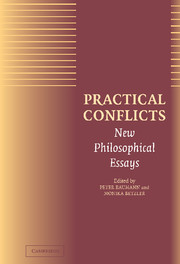Book contents
- Frontmatter
- Contents
- Foreword
- 1 Introduction: Varieties of Practical Conflict and the Scope of Practical Reason
- 2 Willing the Law
- 3 The Myth of Egoism
- 4 Thinking about Conflicts of Desire
- 5 Putting Together Morality and Well-Being
- 6 The Second Worst in Practical Conflict
- 7 Personal Practical Conflicts
- 8 Sources of Practical Conflicts and Reasons for Regret
- 9 Conflicting Values and Conflicting Virtues
- 10 Involvement and Detachment: A Paradox of Practical Reason
- 11 Outcomes of Internal Conflicts in the Sphere of Akrasia and Self-Control
- 12 Are There Insolvable Moral Conflicts?
- 13 Moral Dilemmas of Transitional Justice
- 14 Do Conflicts Make Us Free?
- List of Contributors
- Name Index
- Subject Index
- References
9 - Conflicting Values and Conflicting Virtues
Published online by Cambridge University Press: 02 December 2009
- Frontmatter
- Contents
- Foreword
- 1 Introduction: Varieties of Practical Conflict and the Scope of Practical Reason
- 2 Willing the Law
- 3 The Myth of Egoism
- 4 Thinking about Conflicts of Desire
- 5 Putting Together Morality and Well-Being
- 6 The Second Worst in Practical Conflict
- 7 Personal Practical Conflicts
- 8 Sources of Practical Conflicts and Reasons for Regret
- 9 Conflicting Values and Conflicting Virtues
- 10 Involvement and Detachment: A Paradox of Practical Reason
- 11 Outcomes of Internal Conflicts in the Sphere of Akrasia and Self-Control
- 12 Are There Insolvable Moral Conflicts?
- 13 Moral Dilemmas of Transitional Justice
- 14 Do Conflicts Make Us Free?
- List of Contributors
- Name Index
- Subject Index
- References
Summary
Some philosophers say that goods can “conflict.” Others deny this. What are they disagreeing about? The issue might appear simple, but it turns out to be complex. Among various conflicts generated by our thoughts about what is good, one conflict arises concerning whether to call conflicting things good or to avoid doing so.
Isaiah Berlin cites “freedom and equality” as an example of a conflict between goods. He also says that happiness can conflict with knowledge, mercy with justice, and liberty with fraternity. We may start by making a few remarks about such cases.
It seems utterly implausible to deny that sometimes particular things that we are strongly inclined to insist are good come into conflict, in the sense that gaining more of one can lead to having less of the other. At first sight it seems obvious that both freedom and equality can be called good, and that at least sometimes an increase in one leads to less of the other. True, there might be a case for saying that in the long run, an increase in equality might lead to greater freedom for all. That might happen, for instance, to the extent that restrictions on freedom are generated by resentments caused by inequalities. It seems flatly unbelievable, however, that all conflicts of things that we actually call goods can be so neatly explained.
- Type
- Chapter
- Information
- Practical ConflictsNew Philosophical Essays, pp. 223 - 243Publisher: Cambridge University PressPrint publication year: 2004



